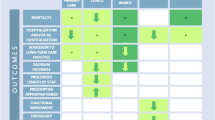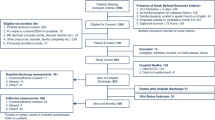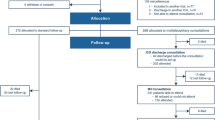Abstract
Background
Delirium is highly prevalent in the general hospital patient population, characterized by acute onset, fluctuating levels of consciousness, and global impairment of cognitive functioning. Mental capacity, its assessment and subsequent consent are therefore prominent within this cohort, yet under-explored.
Aim
This study of patients with delirium sought to determine the processes by which consent to medical treatment was attempted, how capacity was assessed, and any subsequent actions thereafter.
Method
A retrospective documentation review of patients identified as having a delirium for the twelve months February 2013 to January 2014 was undertaken. Inclusion and exclusion criteria were used; demographic and descriptive data collected. A total of n=1153 patients were identified with n=310 meeting inclusion criteria.
Result
A random sample of one hundred patients were subsequently reviewed. One third of patients (n=33) had documentation relating to consent, while four patients had documentation relating to capacity. Median delirium duration was three days, with treatment refusal occurring in twenty-two patients and “duty of care” being used as an apparent beneficent related treatment framework in twelve patients.
Conclusions
While impaired decision-making was indicated, the review was unable to indicate what patient characteristics flag the need for capacity assessment. Documentation relating to consent processes (whether patient or substitute) appeared deficient for this cohort.

Similar content being viewed by others
Notes
In Australia, clinical coders use the coding classification system ICD-10-AM (Australian Modification) to identify and translate the narrative descriptions of diseases, injuries, and procedures contained in medical records into alphanumeric codes, based on Australian classification standards and conventions (Australian Consortium for Classification Development 2015). Although the position is not occupied by health professionals, clinical coding is a specialized skill requiring knowledge of medical terminology, disease processes, medical procedures, attention to detail, and analytical skills. As such, clinical coders receive specialized training by health authorities.
References
Alagiakrishnan, K., T. Marrie, D. Rolfson, et al. 2009. Gaps in patient care practices to prevent hospital-acquired delirium. Canadian Family Physician 55(10): e41–46.
American Psychiatric Association: American Psychiatric Association DSM Task Force. 2013. Diagnostic and statistical manual of mental disorders: DSM-5 2013.
Australian Consortium for Classification Development. 2015. The ninth edition of ICD-10-AM/ACHI/ACS. https://www.accd.net.au/Icd10.aspx.
Australian Institute of Health and Welfare. 2015. http://www.aihw.gov.au/hospitals-data/ar-drg-data-cubes/. Accessed October 29, 2015.
Blake, M. 2008. Religious beliefs and medical treatment. Bond Law Review 19: i.
Briskman, I., R. Dubinski, and Y. Barak. 2010. Treating delirium in a general hospital: A descriptive study of prescribing patterns and outcomes. International Psychogeriatrics 22(2): 328–331.
Collins, N., M.R. Blanchard, A. Tookman, and E.L. Sampson. 2010. Detection of delirium in the acute hospital. Age & Ageing 39(1): 131–135.
Downing, L.J., T.V. Caprio, and J.M. Lyness. 2013. Geriatric psychiatry review: Differential diagnosis and treatment of the 3 D’s-delirium, dementia, and depression. Current Psychiatry Reports 15(6): 1–10.
Fan, E., S. Shahid, V.P. Kondreddi, et al. 2008. Informed consent in the critically ill: A two-step approach incorporating delirium screening. Critical Care Medicine 36(1): 94–99.
Folstein, M.F., S.E. Folstein, and P.R. McHugh. 1975. “Mini-mental state”: A practical method for grading the cognitive state of patients for the clinician. Journal of Psychiatric Research 12(3): 189–198.
Holmboe, E.S. , ed. 2008. Practice audit, medical record review, and chart-stimulated recall. In Practical guide to the evaluation of clinical competence, edited by E.S. Holmboe. and R.E. Hawkins, 60–75. Philadelphia, USA: Mosby Elsevier.
Kerridge, I., M. Lowe, and C. Stewart. 2013. Ethics and law for the health professions, 4th ed. Sydney: Federation Press.
Kim, S.Y.H. 2013. Varieties of decisional incapacity: Theory and practice. The British Journal of Psychiatry 203(6): 403–405.
Lamont, S., S. Brunero, and S. Sharma. 2015. Application and implications of Mental Health Act 2007 (NSW) certificate use in acute generalist settings. Australian Health Review 40(2): 219–224.
Lamont, S., Y.H. Jeon, and M. Chiarella. 2013a. Assessing patient capacity to consent to treatment: An integrative review of instruments and tools. Journal of Clinical Nursing 22(17–18): 2387–2403.
——— 2013b. Health care professionals’ knowledge, attitudes and behaviours relating to patient capacity to consent to treatment: An integrative review. Nursing Ethics 20(6): 684–707.
Mattar, I., M.F. Chan, and C. Childs. 2013. Risk factors for acute delirium in critically ill adult patients: A systematic review. ISRN Critical Care 2013: 10.
Michaud, L., C. Bula, A. Berney, et al. 2007. Delirium: Guidelines for general hospitals. Journal of Psychosomatic Research 62(3): 371–383.
New South Wales Health Department. 2005. Consent to medical treatment—Patient information 2005. http://www.health.nsw.gov.au/policies/PD/2005/pdf/PD2005_406.pdf. Accessed January 12, 2011.
Ryan, D.J., N.A. O’Regan, R.Ó. Caoimh, et al. 2013. Delirium in an adult acute hospital population: predictors, prevalence and detection. BMJ Open 3(1): e001772.
Seyfried, L., K.A. Ryan, and S.Y.H. Kim. 2013. Assessment of decision-making capacity: Views and experiences of consultation psychiatrists. Psychosomatics 54(2): 115–123.
Staunton, P., and M. Chiarella. 2013. Nursing and the law, 7th ed. Sydney: Churchill Livingstone.
Stewart, C., I.H. Kerridge, and M. Parker. 2008. The Australian Medico-Legal Handbook. Sydney: Elsevier.
Su, J-A., C-S. Tsai, T-H. Hung, and S-Y. Chou. 2011. Change in accuracy of recognizing psychiatric disorders by non-psychiatric physicians: Five-year data from a psychiatric consultation-liaison service. Psychiatry & Clinical Neurosciences 65(7): 618–623.
Szalados, J.E. 2008. Decisional incapacity and delirium in the critically ill: What is the real value of the informed consent form? Critical Care Medicine 36(1): 342–343.
Zaubler, T., J.R. Fann, S. Roth-Roemer, W.J. Katon, R. Bustami, and K.L. Syrjala. 2010. Impact of delirium on decision-making capacity after hematopoietic stem-cell transplantation. Psychosomatics 51(4): 320–329.
Author information
Authors and Affiliations
Corresponding author
Rights and permissions
About this article
Cite this article
Lamont, S., Stewart, C. & Chiarella, M. Documentation of Capacity Assessment and Subsequent Consent in Patients Identified With Delirium. Bioethical Inquiry 13, 547–555 (2016). https://doi.org/10.1007/s11673-016-9741-1
Received:
Accepted:
Published:
Issue Date:
DOI: https://doi.org/10.1007/s11673-016-9741-1




